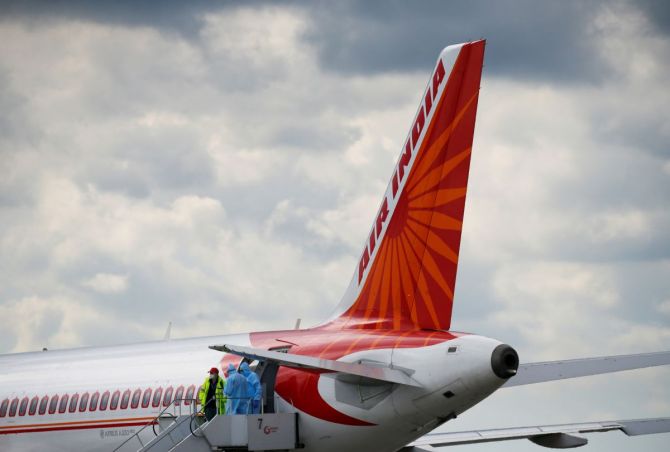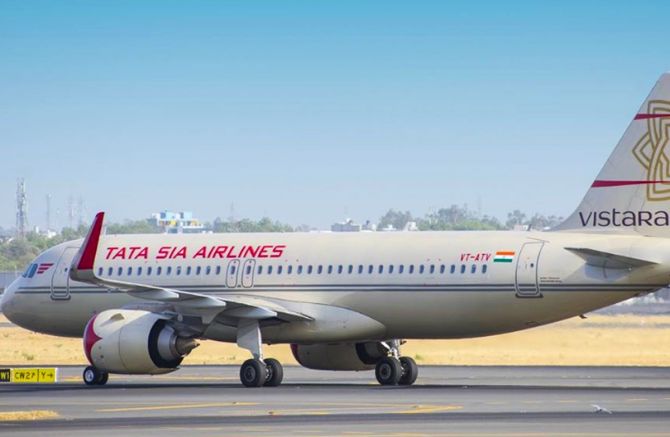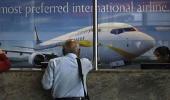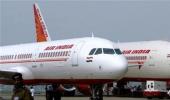The industry is hoping the Tatas deepen their dive and offer two stable airlines -- a Vistara merged into Air India servicing international routes, and an AirAsia India merged with Air India Express that competes with the low fare airlines in India and offers destinations within five hours, says Anjuli Bhargava.

As the August 31 deadline approached, a fair amount of intrigue built up in India's aviation circles over the Tata group's on-the-surface bizarre intention to bid for Air India.
The big question was whether the Tatas were serious about taking over the national carrier or was this just posturing at the behest of the government that didn't want Air India to appear suitor-less.
While a handful of people have that answer, the industry itself has warmed up considerably to the idea.
More and more aviation professionals are coming round to the view that perhaps the best -- if not the only way -- for the Tata group to make good on their aviation gamble is for them to take charge of Air India and merge Vistara into it (one of the sale conditions requires the brand Air India to continue) and AirAsia India into Air India Express. The deadline for expression of interest has since been extended.

Those supporting this view argue that massive investments and time are needed for Vistara to grow, establish itself in the international market, and by the time it is able to use the revenues earned through its international operations to cross-subsidise the losses, it will invariably make (and is already making) in the domestic market, it may be 'too little, too late'.
They argue the losses a full-service airline makes in India's price-sensitive domestic market will bring Vistara to its knees quickly as was the case with the erstwhile Jet and Kingfisher.
Vistara will need to make an investment of over $500 million, albeit in phases, to establish itself on international routes while continuing to bleed on domestic routes.
Many say that buying Jet would have been the best option for Vistara to grow quickly, but that chance was squandered.
A top Jet official who was involved in the negotiations and was present at the September 2018 London meeting told me that this was the 'cardinal mistake' the Tatas made.
The deal would have given them access to Jet's aircraft, the slots, frequencies and highly trained, professional staff.
However, the two sides failed to broker a deal in London.
Buying Air India and merging Vistara with it will offer ready access to a treasure chest of bilateral flying rights, take off and landing slots at airports like Heathrow and JFK.
Air India, beset with all its problems, is unable to fully utilise many of its bilateral flying rights. Many argue these are nothing short of a goldmine.
The national carrier's present share of India's international traffic stands at 18 per cent and this is after Jet's demise. AirAsia India too will gain from the international reach of Air India Express.
But while all this sounds good on paper, everyone knows that it's easier said than done. First, from all indications, Tata's partner in Vistara, Singapore Airlines, has grave reservations about the merger, and these reservations, sources say, have intensified post-Covid-19. It's not clear if SIA will remain a partner in the venture if the Tatas do acquire Air India.

Second, Air India has big liabilities -- a mish-mash of aircraft, flying in varying levels of disuse and disrepair, a poor work culture and the lack of professionalism amongst many of its employees.
The latter is the bigger disadvantage. The experienced cabin crew and engineers are the least of the worry.
It is the swathes of middle-level managers across functions like sales, marketing, finance and HR that are a cause for concern.
Last but not the least, not everyone is convinced that the Tatas have the bandwidth, management depth or expertise to handle a merger of this nature in a business that is largely unfamiliar to the group.
In both the ventures it entered, it had an experienced aviation hand guiding it. Of course, in the case of AirAsia India, a fat lot of good that experience did and the Tatas have been forced to step in and take charge.
Many Tata loyalists believe that the group has already bitten off more than it can chew. Taking on Air India could well be the last straw.
While everyone is convinced that none will be unscathed, it is still a matter of much debate which of the Indian airlines will eventually emerge from the debris of the Covid pandemic.
With some of them on the verge of closure, the industry is hoping the Tatas deepen their dive and offer two stable airlines -- a Vistara merged into Air India servicing the international routes, and an AirAsia India merged with Air India Express that competes with the low fare airlines in India and offers destinations within five hours.
This may lead to a more stable sector with Indian-owned carriers taking on a bigger role than they have so far, an outcome most would welcome.
Feature Presentation: Rajesh Alva/Rediff.com.











